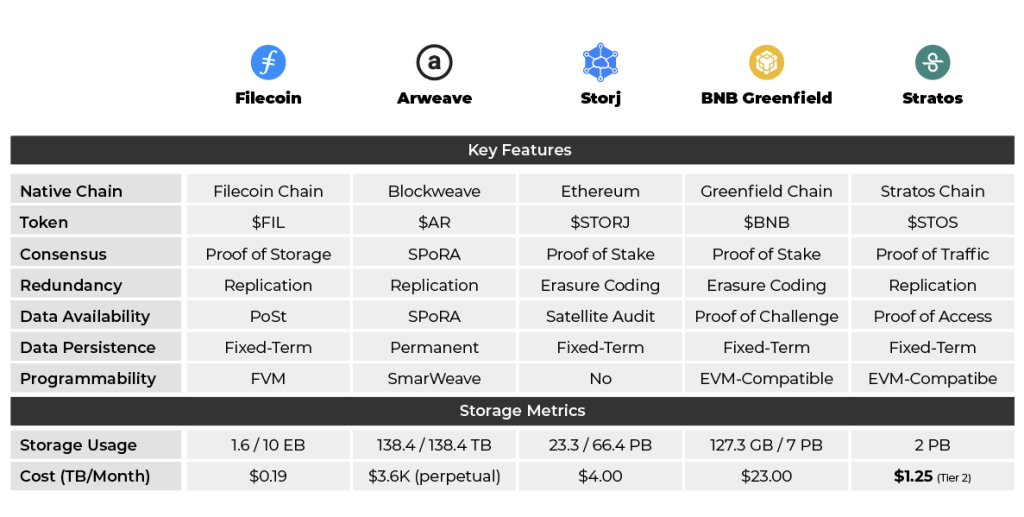
The post Decentralized Data Storage in 2023: A Review of the Leading Services Providers appeared first on Coinpedia Fintech News
When considering data storage solutions there has been a transformation from traditional data centers to the adoption of cloud computing. However, as technology advances the focus is moving toward distributed storage systems often utilizing blockchain technology.
Cloud servers have offered convenience and efficiency in data storage but have raised security concerns. Major cloud providers like Amazon and Google being dominant in their respective industries have faced scrutiny for potential privacy breaches due to the absence of encryption for user files, making data vulnerable to manipulation.
Similarly, centralized data storage provides benefits like availability, speed, low latency, and quick data access. However, it comes with costs, and the risk of a breach of a single centralized server can result in data compromise for many users.
In response to these challenges, decentralized storage solutions have gained popularity. These solutions eliminate the reliance on a vulnerable centralized server by breaking files into multiple parts and distributing them across various nodes or servers. This approach reduces external control over user data, enhancing privacy and security.
While decentralized storage represents a significant improvement, it also has its limitations. This is where blockchain data storage emerges as a natural solution to further enhance the concept of decentralized storage, providing advanced security and refining the data storage paradigm.
Take a look at the leading Decentralised Data storage service providers below.
Arweave: Transforming Data Storage for Eternity
Arweave(AR) introduces a groundbreaking solution for permanent data storage. Unlike traditional options, it leverages the Blockweave, a secure and efficient blockchain database. Miners are incentivized to host data, ensuring long-term storage reliability. Users pay once for permanent storage, making it affordable and accessible.
Arweave serves diverse needs, from storing family history and art to legal documents and academic papers. Over 300 applications are built on Arweave, bridging the gap between this technology and everyday users. The possibilities for permanent data storage are boundless, promising innovative solutions for various fields.
Furthermore, Arweave has been adopted by a few significant blockchain networks to store blockchain data. Blockchains use Arweave to store transaction history, which includes:
- Avalanche ( AVAX)
- Solana ( SOL)
- Polkadot (DOT)
- Cosmos (ATOM)
- NEAR Protocol (NEAR)

Filecoin: Revolutionizing Decentralized Storage
Since the start of 2022 data providers for Filecoin, a decentralized file-sharing system, have increased significantly—nearly seven times. Colin Evran, co-lead at Protocol Labs, stated during a FIL event in Singapore that storage providers on the Filecoin network are expanding at a 20% monthly pace, with significant activity in North America, Korea, and Hong Kong. Additionally, the Filecoin blockchain is seeing the active development of applications by roughly 7,000 new developers.
In contrast to centralized companies such as Amazon Web Services, Filecoin (FIL) enables users to exchange computer storage on a decentralized system intended for data and file storage. This expansion demonstrates the growing popularity of decentralized storage as well as Filecoin’s growing role in its support.
Approximately 20,000 individual users presently use Filecoin to store more than 50 million data objects, which are essential for operating decentralized apps (dApps), according to Protocol Labs creator Juan Benet. This significant rise comes before the Filecoin Virtual Machine (FVM), which will allow developers to build decentralized apps on the Filecoin network, launched in early 2023.
Stratos: A Decentralized Infrastructure Network
Stratos (STOS) serves as the underlying cryptocurrency for the Stratos platform, a decentralized data mesh designed to provide scalable, secure, and self-balanced storage, database, and computational capabilities for decentralized applications (dApps).
It emerges as the unrivaled leader in decentralized storage, recognized for its exceptional speed and performance. Pioneering the first-ever enterprise-level decentralized storage solution, Stratos is not merely a platform but the vanguard architect of the decentralized AWS for blockchain and Web3. Powered by the innovative Proof-of-Traffic Consensus, a unique creation of the Stratos team, the network thrives on real-time traffic, offering enhanced incentives for network miners.
Stratos storage is fully decentralized system. Each file on the Stratos Storage network will be divided into multiple pieces based on size, and each piece has 5 copies. For example, a 300MB file is divided into 10 parts in five copies. With 50 points located on various nodes around the world, we provide decentralized access to files, regardless of the situation.
The newly launched Stratos Mainnet is a significant step in their mission to redefine data storage and Web 3.0 infrastructure. It caters to various data types and offers versatile use cases, from GameFi and NFT storage to content delivery.
Stratos has partnered with StakingCabin as a professional validator who will help Stratos network in verifying transactions and validating blocks, all of which are crucial components of a solid blockchain ecosystem. This collaboration will not only carry the network’s security but also contribute to its decentralization, a core principle of blockchain technology.
BitTorrent: Efficient File-Sharing Protocol
BitTorrent (BTT) is a P2P file-sharing protocol and cryptocurrency that efficiently enables large file sharing, utilizing swarming technology and a central tracker, while incentivizing users to share files Introduced in December 2021, BitTorrent Chain (BTTC) is a pivotal component within the BitTorrent ecosystem.
BTTC functions as a blockchain scaling solution, providing heterogeneous cross-chain interoperability, allowing for seamless asset transfers between different blockchain networks, including Ethereum Virtual Machine-based chains like BNB Smart Chain and Ethereum, facilitated through the BTCC Bridge’s token mapping mechanism.
BTTC operates on a proof-of-stake (PoS) consensus method, ensuring security, and it maintains impressively low average gas fees, typically below $0.01, reducing transaction costs. Validators on BTTC periodically transfer blocks to other networks like BNB Smart Chain and Ethereum, fostering cross-chain communication through checkpoint submissions that yield rewards. Moreover, BTTC supports smart contract extensions via sidechains, making it an attractive choice for developers seeking to create decentralized applications (DApps) and seamlessly transition into this blockchain ecosystem.
Conclusion
The evolution of data storage is moving towards decentralized solutions, utilizing blockchain technology for enhanced security. Arweave and Filecoin offer permanent data storage, while BitTorrent Chain (BTTC) enables seamless asset transfers across blockchains. Stratos (STOS) provides secure, scalable storage with a unique Proof-of-Traffic (PoT) consensus mechanism, provides good performance, highly reliable, fully decentralized and very cost competitiveness storage solution for Crypto industry and traditional industry , These innovations offer exciting potential, but the volatile nature of the cryptocurrency market calls for prudent investment.

 1 year ago
93
1 year ago
93














 English (US) ·
English (US) ·